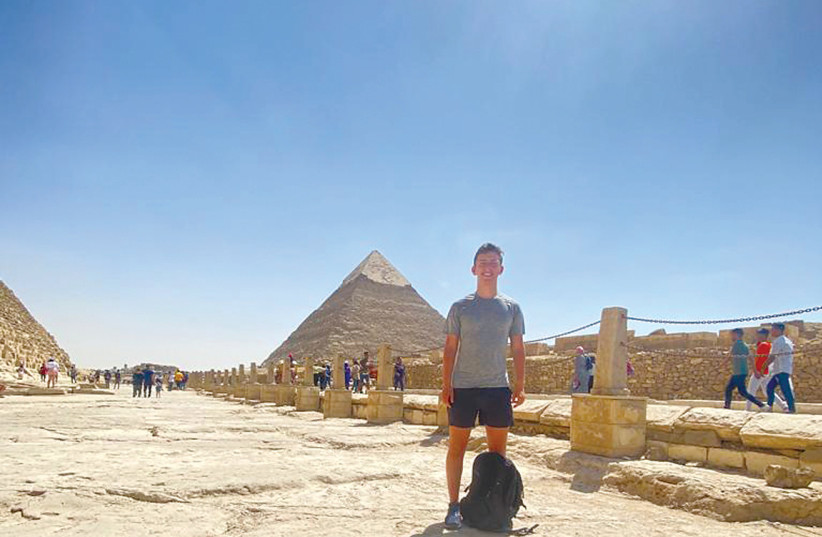Sometimes it takes a simple look around your surroundings to realize that there is something you are missing. That was the case for Isaac Ohrenstein, 20, a first-year student at Harvard University.
While studying at a Jerusalem yeshiva during a gap year between high school and college, a family friend gave Ohrenstein a tour around the Old City, where he lived. Ohrenstein realized that he knew little about his neighbors, even though they all resided within a 10-15 minute walk from him. As a result, he decided he wanted to explore the regions from which they hailed and learn about different cultures, with the goal of seeking common ground between Jews and Arabs.
In addition to the Missouri native’s US passport, which is stamped with an Israeli visa, Ohrenstein has a British passport (his father has British citizenship), making it much easier for him to travel to other countries. His odyssey took six months, with visits to 33 countries in Asia, Africa, Europe and the Middle East. While no place is the same when traveling, there were common themes, such as an affinity with the Jewish people and culture. Along the way, Ohrenstein made sure to visit the local Jewish communities, either at a synagogue or at local Chabad centers, as well as speak with Israeli envoys and ambassadors.
His travels included a memorable visit to the last Jewish shtetl in the world, located in Qirmizi Qasaba, Azerbaijan, which is close to Iran. While there, he met with the locals and learned about their customs and cultures, such as their language, called Judeo-Tat, and their cuisine inspired by the Caucasus.
Traveling to such destinations and meeting with Israelis and Jews gave him an opportunity to gain different perspectives on contentious topics. He recalled one poignant experience while in Alexandria, Egypt, as he toured with a woman originally from Sudan, who is a professor of Palestinian studies at a Canadian university. They spent the day talking, touring, and visiting war monuments from the 1973 War, as the Yom Kippur War is known in Egypt. He learned about the conflict from her perspective, and her family’s history and interactions with Jews. For Ohrenstein, the encounter helped him see the humanity aspect of conflict.

Encountering antisemitism in states hostile to Israel
WHILE TRAVELING to states hostile to Israel, he ran the risk of encountering antisemitism. Malaysia, in particular, is a hotbed of Jew-hatred, Ohrenstein said. The “striking moments of antisemitism” played itself out in a country that actually has no Jews and no infrastructure for Jewish life.
In a conversation with the chief rabbi of Singapore, he learned that it is almost impossible to do business in Malaysia if you are Jewish. Malaysia is one of many countries that forbid entry to anyone holding an Israeli passport. On this trip, he made sure to avoid conversations about his Jewishness.
Ohrenstein also saw the main synagogue in Turkey that was attacked by ISIS twice. “You could still see the bullet holes,” he recounted. He also mentioned that there are helmets under the seats – a scary reality to think about.
He was most surprised by the “amazing amount of receptivity to Israel and Israeli business culture” in the Gulf states. “It was unbelievable to walk around downtown Dubai and see kippot. I didn’t even see that in Brussels,” he recalled. “It is safer to be Jewish in some Arab counties than in Europe.”
“It was unbelievable to walk around downtown Dubai and see kippot. I didn’t even see that in Brussels. It is safer to be Jewish in some Arab counties than in Europe.”
Isaac Ohrenstein
Regarding Jewish life, he said there is an incredible vibrancy that he didn’t fully grasp until arriving, both in terms of diversity of practices and communities. He emphasized that the locals appreciated “that someone Jewish respected their culture,” saying also that “people hear you are Jewish and call you their brother.” Overall, he sensed the warmth and community throughout the Arab world.
When it came to the issue of Palestinians, Ohrenstein observed that opinions depended on the physical proximity to the conflict. For example, he said people in Azerbaijan and Kazakhstan did not care much, whereas in Qatar there is a “real sense of affinity to the Palestinians.” In Jordan, he felt there was a delicate balance between the desire for Israeli tourist money and a discomfort with serving Israelis.
In general, though, his Jewishness was rarely an issue, as he proudly donned a kippah in many countries.
Ohrenstein believes that the “Western dream remains alive in Arab states,” which see Israel as intangibly associated with that dream. “Just look at the popularity of McDonald’s, KFC and the Hard Rock Cafe in these countries,” he noted. “The [local population] wants to travel and have the opportunity to retire. Doing business with Israel means getting to that place.”
Ohrenstein, who is majoring in social studies at Harvard, with a focus on politics and economics, hopes to translate his experiences into building relations between Jews and Arabs. In particular, he sees hope coming from the Abraham Accords. At some point he plans to make aliyah; in the meantime, he will be interning in Israel this summer with a venture capital company.
“I really want people to see that doing [a trip like this] is possible. I felt very boxed in at yeshiva and in an American bubble in Israel,” he said. “I remember sitting in the beit midrash (study hall) and booking flights. This trip really broadened my horizons and let me build relationships. It is something that gives hope.”
He joked that people initially thought he was crazy to embark on this journey. They were concerned about his safety and felt he might be wasting his time. But now, he said, they see the power in connecting with others and the value of interaction to dispel hate and bring people across the region, and the world, together. ❖
